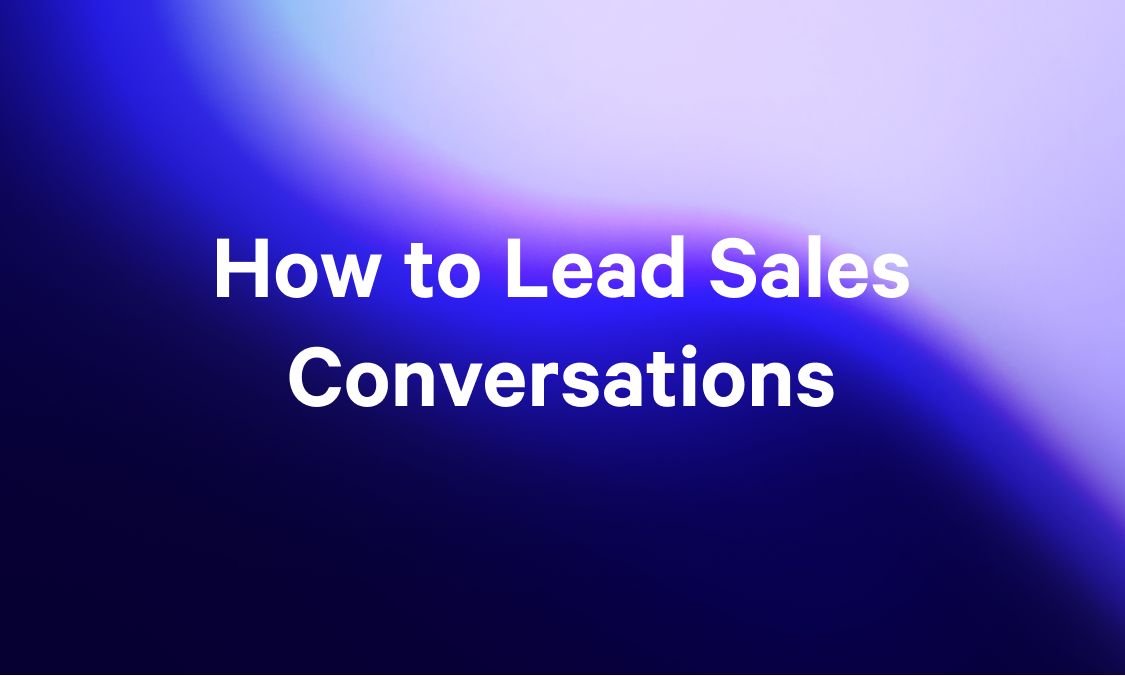Confidence is a core quality shared by all successful salespeople. You wonder if they were born that way - when you watch a pitch delivered by someone exuding sales confidence, it’s easy to imagine that they’re just ‘naturally confident’.
While we can’t deny the existence of naturally confident people, sales confidence is a quality that can be nurtured and developed, just like any other skill. In this article, we’ll explore the fundamental factors that underpin sales confidence, and show you a range of strategies you can deploy to empower and enable sales professionals at every level.
What is sales confidence?
Schtick, patter, smooth talk, snake oil… these are just some of the terms commonly associated with sales talk. However, real sales confidence is rooted in more genuine styles of communication. A showy, extroverted persona is by no means a prerequisite - in fact, studies have shown that introverts can enjoy just as much success in B2B sales roles.
This aligns with key sales traits that successful salespeople often embody, regardless of their natural disposition.
An effective sales conversation is a two-way street. Successful sales professionals understand that building rapport is an essential first step towards creating the trust that increasingly defines sales relationships. 74% of buyers feel that honest and transparent communication is more important now than it was pre-pandemic.
Encouraging the customer to talk about themselves will create a stronger connection, that an effective sales rep can use to foster an open and honest dialogue.
A relaxed sales conversation where both parties can speak freely will enable more effective negotiations, too, and confidently laying the groundwork in this way makes it easier to say ‘no’ to a customer, without fear of causing offense.
Often, this confidence to effectively handle tricky conversations (such as when customers ask for discounts) comes with experience, as well as a set of solid negotiating strategies that allow both parties to get what they want by modifying the deal - rather than just granting the customer’s request.
Why sales confidence is crucial to success
A lack of confidence can render your sales process useless. You can have the best product, a perfect USP, a hungry audience, but without confident salespeople, you’ll struggle to close a single deal. And the successful implementation of almost any sales strategy or tactic will require sales confidence to make it work.
It transfers confidence to the customer
To close sales deals, the customer needs to feel confident in the product before they can buy. An effective salesperson makes this happen by sharing their own confidence, transferring their belief to the customer, and leaving them reassured they’ve found the best solution to their problems.
It’s psychologically persuasive
While the importance of non-verbal communication has been overstated and misrepresented in the past, it’s still true that human communication can be affected by things like differences in tone of voice, body language, or environmental cues.
Part of the appeal of a confident speaker is the consistency between the words they say, and the way they deliver the information. A bright, clear, upbeat speaking style is usually considered to be an advantage in most communication situations, and sales are no exception.
It gives you greater control over the sales conversation
In order to develop rapport, sales professionals need to have the confidence to fully explore the problems of their clients. Sometimes, this involves going beyond what’s been requested and asking the questions necessary to open up all possible solutions - not just those that the client has identified.
This proactive approach is only possible for sales reps working with a sufficient level of confidence.
It can open up more opportunities
For companies and sales teams deploying omnichannel strategies, sales confidence makes it easier for salespeople to adapt to new channels and ways of selling.
For example, teams experimenting with social selling may need to think more creatively about how they engage with potential leads across LinkedIn, Reddit, Slack Groups, Facebook Groups, and other places where clients are likely to spend time. SDRs and BDRs will need to trust in their own abilities, in order to ditch the script and create rapport across a variety of contexts and platforms.
It increases your ability to re-engage lost leads
Following up on lost leads is often a thankless task. It requires a degree of resilience and persistence that would be hard to maintain without high levels of confidence. However, 80% of won deals require an average of five follow-up calls - and few salespeople are prepared to go that far, with 44% of reps giving up after a single follow-up call.
An ability to re-engage prospects - even if it’s just to acquire actionable feedback for further sales training - means that confident sales reps are more likely to win back lost leads (and learn not to take it personally when they get ghosted).
Tips for building sales confidence for sales reps
Here, we’ve collated some of our favorite methods for building sales confidence. There’s a mix of tools here that sales leaders can leverage for sales training, embed into processes, and use to enhance workplace culture and customer-facing philosophies.
Deploy tone of voice sales coaching
Thanks to the dubious pleasures of voice notes, Zoom recordings, etc, in the modern era everyone tends to have a fairly good idea of how their voice sounds to other people.
Nevertheless, any sales team that incorporates structured tone of voice training as part of their sales coaching program is likely to reap significant benefits. Role-playing exercises (preferably with a partner or very small groups) can be recorded for further tonal analysis. Regular practice sessions, using a systematic approach based on the eight different tonal patterns will allow your sales reps to sound - and feel - more confident.
Harness words and techniques of persuasion
Almost 40 years after it was written, Robert Cialdini’s ‘Influence: The Psychology of Persuasion’ is still essential reading for anyone working in sales or marketing. While the six principles of persuasion Cialdini outlines are rooted in decades of intensive research, deploying these principles effectively in sales conversations can be relatively easy to achieve.
Persuasive words don’t tend to be complicated - but strategically using words like ‘you’, ‘new’, and ‘because’ can yield powerful psychological effects. In ‘Influence’, Cialdini references a study where adding a ‘because’ allowed a researcher to jump the queue for the Xerox machine. The researcher asked, ‘Excuse me, I have five pages. May I use the Xerox machine because I have to make some copies?
Cialdini points out;
“The result was that once again nearly all (93 percent) agreed, even though no real reason, no new information, was added to justify their compliance…the word “because” triggered an automatic compliance response”.
Utilize your sales collateral
Your sales presentation materials provide a great opportunity to build the customer’s confidence in your sales process - which in turn will increase your salespeople’s confidence in their ability to quickly create a rapport using every means at their disposal.
Using generic sales collateral is one of the most common sales mistakes. It’s also one of the most avoidable. With Qwilr, you can personalize your sales collateral in seconds, adding biographical detail and logos to our customizable templates. Even better, update the body text and intro to explicitly reference prior conversations and needs discussed with your prospect.
Create positive feedback loops
This may sound a little obvious, but in order to improve sales performance, people need to know they’re good at what they do. Any ongoing sales coaching program has to incorporate consistent encouragement, along with a constructive emphasis on areas for development.
Build in regular opportunities for all your sales professionals to discuss and reflect on their progress with their sales manager. The more you enable them to honestly reflect on both their own strengths and weaknesses (as well as those of the wider team and company), the quicker they’ll reach the next level of confidence.
Maximize use of multiple channels
If your company (like most) uses an omnichannel sales strategy, this can provide many opportunities for BDRs and SDRs to explore the client relationship from different angles.
Taking these interactions out of the familiar context of the sales conversation, and placing them within a social media environment will allow your salespeople to explore new ways of building rapport - giving them a fuller, more nuanced understanding of the people they’re selling to.
Emphasize frameworks, not scripts
For those who suffer from lack of confidence, a sales script can be both a blessing and a curse. It’s useful to always have the right words to hand (and much better than awkward silences, umms, and ahhs). However, over time the script can become a crutch, allowing salespeople’s professional development to stagnate and sales calls to become stilted.
A sales conversation framework is a much more effective tool for building sales confidence. It allows the salesperson to guide the conversation towards a set of conceptual goals, while still leaving enough room to completely personalize the conversation around the buyer. The RAIN framework (Rapport, Afflictions/Aspirations, Impact, New reality) is a popular and effective example of how sales conversations can be carefully managed without becoming too prescriptive.
FAQs
Why is confidence important in sales?
A confident salesperson transfers their confidence to the customer and sends psychological signals that help foster trust. Sales confidence allows you to guide the sales conversation effectively, and can create a more honest and open dialogue which further builds rapport.
How can you be confident in a sales pitch?
To communicate your sales confidence, use psychologically persuasive language, and modulate your tone of voice to reflect the emotional intentions of what you’re saying.
Become confident with the right tools
Sales confidence isn’t a trick. It’s a combination of great leadership, a nurturing and effective workplace environment, and a set of consistently applied strategies designed to systematically enhance the communication skills of your sales team.
In order to build sales confidence, your sales professionals need sales collateral - including sales presentation and proposal materials they can rely on to meet the evolving expectations of each and every client. With Qwilr’s engaging customizable templates, your sales collateral will help your sales team quickly demonstrate their understanding of your client’s needs.
About the author

Dan Lever|Brand Consultant and Copywriter
Dan Lever is an experienced brand consultant and copywriter. He brings over 7 years experience in marketing and sales development, across a range of industries including B2B SaaS, third sector and higher education.


